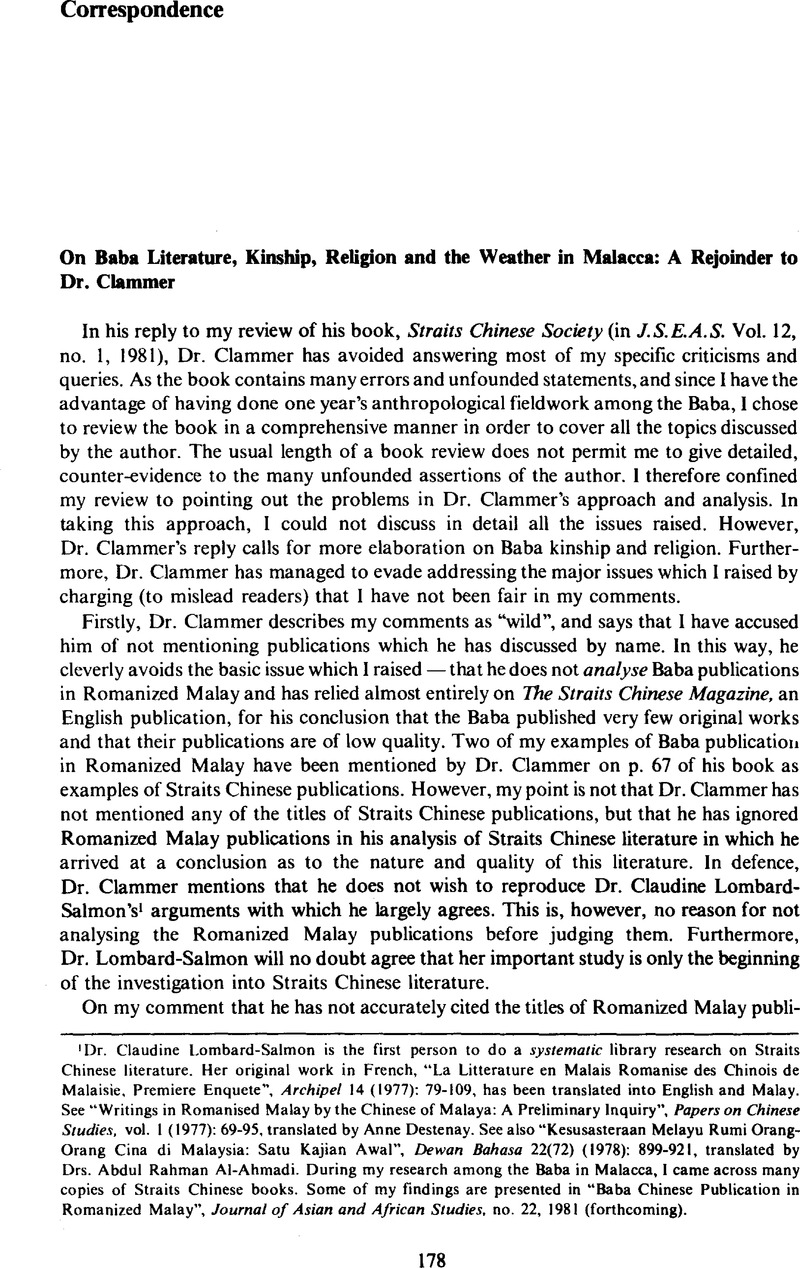No CrossRef data available.
Published online by Cambridge University Press: 07 April 2011

1 Dr. Claudine Lombard-Salmon is the first person to do a systematic library research on Straits Chinese literature. Her original work in French, “La Litterature en Malais Romanise des Chinois de Malaisie, Premiere Enquete”, Archipel 14 (1977): 79–109CrossRefGoogle Scholar, has been translated into English and Malay. See “Writings in Romanised Malay by the Chinese of Malaya: A Preliminary Inquiry”, Papers on Chinese Studies, vol. 1 (1977): 69–95Google Scholar, translated by Anne Destenay. See also “Kesusasteraan Melayu Rumi Orang-Orang Cina di Malaysia: Satu Kajian Awal”, Dewan Bahasa 22 (72) (1978): 899–921Google Scholar, translated by Drs. Abdul Rahman Al-Ahmadi. During my research among the Baba in Malacca, I came across many copies of Straits Chinese books. Some of my findings are presented in “Baba Chinese Publication in Romanized Malay”, Journal of Asian and African Studies, no. 22, 1981 (forthcoming)Google Scholar.
2 Soon, Tan Teck, “Some Genuine Chinese Authors”, The Straits Chinese Magazine 1 (2) (1897): 63–68Google Scholar.
3 Chan, Wing-tsit, Religious Trends in Modern China (New York: Columbia University Press, 1953)Google Scholar.
4 Yang, C.K., Religion in Chinese Society (Berkeley: University of California Press, 1961)Google Scholar.
5 Ibid., p. 140.
6 Cf. Wing-tsit Chan, op. cit., p. 7
7 Cf. Hoay, Kwee Tek, The Origins of the Modern Chinese Movement in Indonesia, trans, by Williams, Lea E. (N.Y.: Cornell University, Southeast Asia Program, 1969), p. 5Google Scholar; Williams, Lea E., Overseas Chinese Nationalism: The Genesis of the Pan-Chinese Movement in Indonesia, 1900–1916 (Glencoe, Illinois: The Free Press, 1960), p. 55Google Scholar; Suryadinata, Leo, The Chinese Minority in Indonesia: 7 Papers (Singapore: Chopmen Enterprises, 1978), pp. 33–62Google Scholar; and Hwang, Yen Ching, The Overseas Chinese and the 1911 Revolution (Kuala Lumpur: Oxford University Press, 1976), pp. 43 and 70Google Scholar.
8 The topic for the essay competition this year is about the contribution of Confucian philosophy to Chinese culture. See Sin Chew Jit Poh Malaysia (Xingzhou Ribao), 17 July 1981, p. 5.
9 Deijiao Hui is a Chinese religious sect which worships Laozi, Buddha, Confucius, all kinds of Chinese deities as well as Prophet Mohammad and Jesus Christ. It started as a nativistic movement in China. I am currently doing research on Chinese religion and am at present focusing my attention on Deijiao Hui. However, I have not yet carried out any in-depth study of Confucian societies in Malaysia and Singapore. From the little bit of published material available, we know that in the first part of the twentieth century, there were people who tried to turn Confucian teachings into a religion. This is especially so in Indonesia, see fn. 7.
10 Clammer, John R., The Ambiguity of Identity: Ethnicity Maintenance and Change among the Straits Chinese Community of Malaysia and Singapore (Occasional paper, no. 54, Singapore, Institute of Southeast Asian Studies, 1974), p. 4Google Scholar.
11 Freedman, Maurice, “An Epicycle of Cathay; or, the Southward Expansion of the Sinologists”, Social Organization and the Applications of Anthropology: Essays in Honor of Lauriston Sharp, ed. Smith, Robert J., pp. 303–322 (Ithaca, N.Y.: Cornell University Press, 1974)Google Scholar.
12 Purcell, Victor, The Chinese in Malaya (London, Oxford University Press, 1948), p. 38Google Scholar.
13 Golomb, Louis, Brokers of Morality: Thai Ethnic Adaptation in a Rural Malaysian Setting (Honolulu: The University Press of Hawaii, 1978)Google Scholar.
14 See my articles, “Baba Chinese, Non-Baba Chinese and Malays: A Note on Ethnic Interaction in Malacca”, Southeast Asian Journal of Social Science 7 (1–2): 20–29, 1979CrossRefGoogle Scholar; and “Ethnic Relations in Malaysia”, Ethnicity and Interpersonal Interaction: A Cross-Cultural Study, ed. Wu, David (Singapore: Maruzen Asia, 1981, forthcoming)Google Scholar.